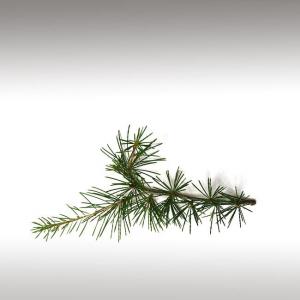
HIMALAYAN CEDARWOOD ESSENTIAL OIL (CEDRUS DEODARA) - ESSENTIAL OILS

BASE / GENERAL DATA
Information submited: May 29, 2015 Modified: March 13, 2018 By: OperaDreamhouse
Botanical Name: Cedrus deodora
Common Method of Extraction: Steam distillation
Part Typically Used: Wood
Color: brownish-yellow
Consistency: Slightly viscous liquid
Perfumery Note: Middle / Base
Strength of Initial Aroma: Clean balsamic, woody, rich, herbaceous, pleasant, woody-balsamic undertone.
The botanical name, which is also the English common name, derives from the Sanskrit term Devadāru, which means "Wood of the gods", a compound of Deva "God" and Dāru "Wood, tree". Among Hindus, as the etymologyof Deodar suggests, it is worshiped as a Divine tree.
It is widely grown as an ornamental tree, often planted in parks and large gardens for its drooping foliage. General cultivation is limited to areas with mild winters, with trees frequently killed by temperatures below about −25 °C.
Cedrus Deodara (Deodar Cedar, Himalayan Cedar, or Deodar, Devdar, Devadar, Devadaru) is a species of Cedar native to the western Himalayas in eastern Afghanistan, northern Pakistan, north Republic of India (Jammu, Kashmir, Himachal Pradesh and Uttarakhand states), southwestern Tibet and western Nepal, occurring at 1,500 - 3,200 maltitude.
It is a large evergreen coniferous tree reaching 40 - 50 m tall, exceptionally 60 m with a trunk up to 3 m in diameter. It has a conic crown with level branches and drooping branchlets. Its needle - like leaves are triquetrous, present in whorls and dark green with a silver sheen.
Flowers, open in autumn, are cone - like in shape and occur upright on horizontal branches. Similar to other Cedars, the Heartwood of Himalayan Cedarwood is highly aromatic and yields about 2,1% of essential oil.
Deodar is in great demand as building material because of its durability, rot -r esistant character and fine, close grain, which is capable of taking a high polish. Its historical use to construct religious temples and in landscaping around temples is well recorded. Its rot - resistant character also makes it an ideal wood for constructing the well-known houseboats of Srinagar, Kashmir.
Forests full of Deodar or Devadāru trees were the favorite living place of ancient Indian sages and their families who were devoted to the Hindu god Shiva. To please Lord Shiva, the sages used to perform very difficult tapasya (meditation) practices in Deodar forests. Also the ancient Hindu epics and Shaivite texts regularly mention Darukavana, meaning a Forest of deodars, as a Sacred place.
Cedarwood essential oil is collected from wood chips and sawdust.
The inner wood is aromatic and used to make incense. Inner wood is distilled into essential oil. Produces an oil very similar to the Atlas Cedarwood. Cedar trees date back to the Bible where they symbolised everything fertile and abundant.
Most of the Cedarwood oils are obtained from wild trees but little information is published on the extent to which oil production may have affected the natural resource. In Kenya, as already noted, there has been a serious depletion of the wild trees as a result of over - exploitation for timber and oil. The position in the People's Republic of China is not known. American oil production utilizes waste wood from trees felled for timber as well as the considerable areas where the junipers grow as invasive "weeds".
For those cases where the trees are utilized for both timber and oil production sawdust, wood shavings and other waste wood materials from the saw mills are taken to the distillery for steam distillation and recovery of oil in the normal manner. Sawdust should not be exposed to direct sunlight before distillation, otherwise oil yields and quality are diminished.
In steam distillation process, the plant material is heated with water which produces a steam that contains the volatile oils from the plant. The steam is then cooled, which condenses the oil, and it is separated from the water and collected.
The deodar tree is the national tree of Pakistan.
Chemical structure:
Chemically and biologically this oil can be used as Atlas Cedarwood. It is also a true cedar. Since it is from the Himalayan Mountains and is associated with Tibet, there is a special place for this oil just to have these vibrations in our home.
Common Method of Extraction: Steam distillation
Part Typically Used: Wood
Color: brownish-yellow
Consistency: Slightly viscous liquid
Perfumery Note: Middle / Base
Strength of Initial Aroma: Clean balsamic, woody, rich, herbaceous, pleasant, woody-balsamic undertone.
The botanical name, which is also the English common name, derives from the Sanskrit term Devadāru, which means "Wood of the gods", a compound of Deva "God" and Dāru "Wood, tree". Among Hindus, as the etymologyof Deodar suggests, it is worshiped as a Divine tree.
It is widely grown as an ornamental tree, often planted in parks and large gardens for its drooping foliage. General cultivation is limited to areas with mild winters, with trees frequently killed by temperatures below about −25 °C.
Cedrus Deodara (Deodar Cedar, Himalayan Cedar, or Deodar, Devdar, Devadar, Devadaru) is a species of Cedar native to the western Himalayas in eastern Afghanistan, northern Pakistan, north Republic of India (Jammu, Kashmir, Himachal Pradesh and Uttarakhand states), southwestern Tibet and western Nepal, occurring at 1,500 - 3,200 maltitude.
It is a large evergreen coniferous tree reaching 40 - 50 m tall, exceptionally 60 m with a trunk up to 3 m in diameter. It has a conic crown with level branches and drooping branchlets. Its needle - like leaves are triquetrous, present in whorls and dark green with a silver sheen.
Flowers, open in autumn, are cone - like in shape and occur upright on horizontal branches. Similar to other Cedars, the Heartwood of Himalayan Cedarwood is highly aromatic and yields about 2,1% of essential oil.
Deodar is in great demand as building material because of its durability, rot -r esistant character and fine, close grain, which is capable of taking a high polish. Its historical use to construct religious temples and in landscaping around temples is well recorded. Its rot - resistant character also makes it an ideal wood for constructing the well-known houseboats of Srinagar, Kashmir.
Forests full of Deodar or Devadāru trees were the favorite living place of ancient Indian sages and their families who were devoted to the Hindu god Shiva. To please Lord Shiva, the sages used to perform very difficult tapasya (meditation) practices in Deodar forests. Also the ancient Hindu epics and Shaivite texts regularly mention Darukavana, meaning a Forest of deodars, as a Sacred place.
Cedarwood essential oil is collected from wood chips and sawdust.
The inner wood is aromatic and used to make incense. Inner wood is distilled into essential oil. Produces an oil very similar to the Atlas Cedarwood. Cedar trees date back to the Bible where they symbolised everything fertile and abundant.
Most of the Cedarwood oils are obtained from wild trees but little information is published on the extent to which oil production may have affected the natural resource. In Kenya, as already noted, there has been a serious depletion of the wild trees as a result of over - exploitation for timber and oil. The position in the People's Republic of China is not known. American oil production utilizes waste wood from trees felled for timber as well as the considerable areas where the junipers grow as invasive "weeds".
For those cases where the trees are utilized for both timber and oil production sawdust, wood shavings and other waste wood materials from the saw mills are taken to the distillery for steam distillation and recovery of oil in the normal manner. Sawdust should not be exposed to direct sunlight before distillation, otherwise oil yields and quality are diminished.
In steam distillation process, the plant material is heated with water which produces a steam that contains the volatile oils from the plant. The steam is then cooled, which condenses the oil, and it is separated from the water and collected.
The deodar tree is the national tree of Pakistan.
Chemical structure:
Chemically and biologically this oil can be used as Atlas Cedarwood. It is also a true cedar. Since it is from the Himalayan Mountains and is associated with Tibet, there is a special place for this oil just to have these vibrations in our home.

SPIRITUAL PRACTISES DATA

MEDICINE / HEALTH DATA

BEAUTY / COSMETICS DATA

FOOD / COOKING DATA
COMMENTS
No comments.


